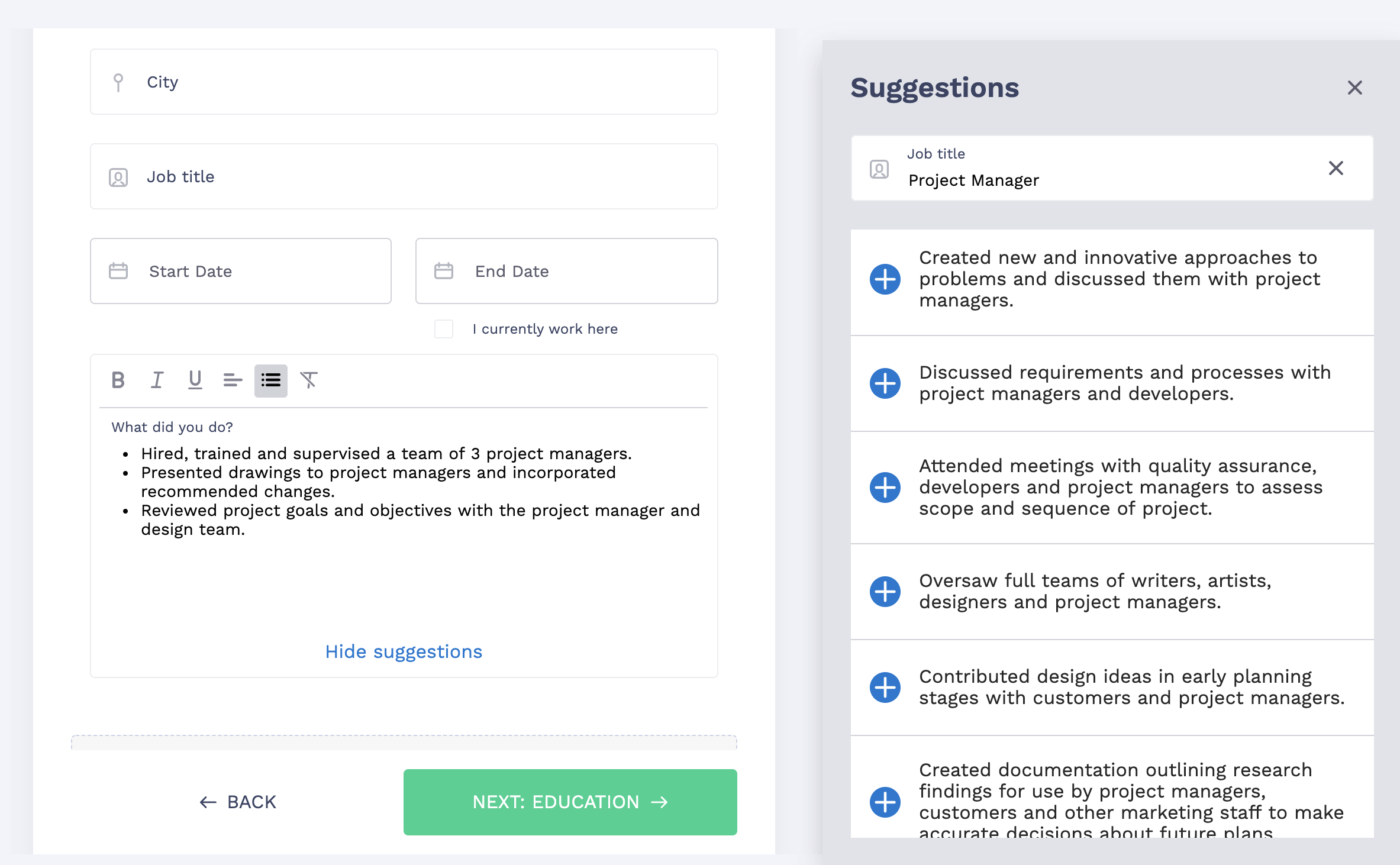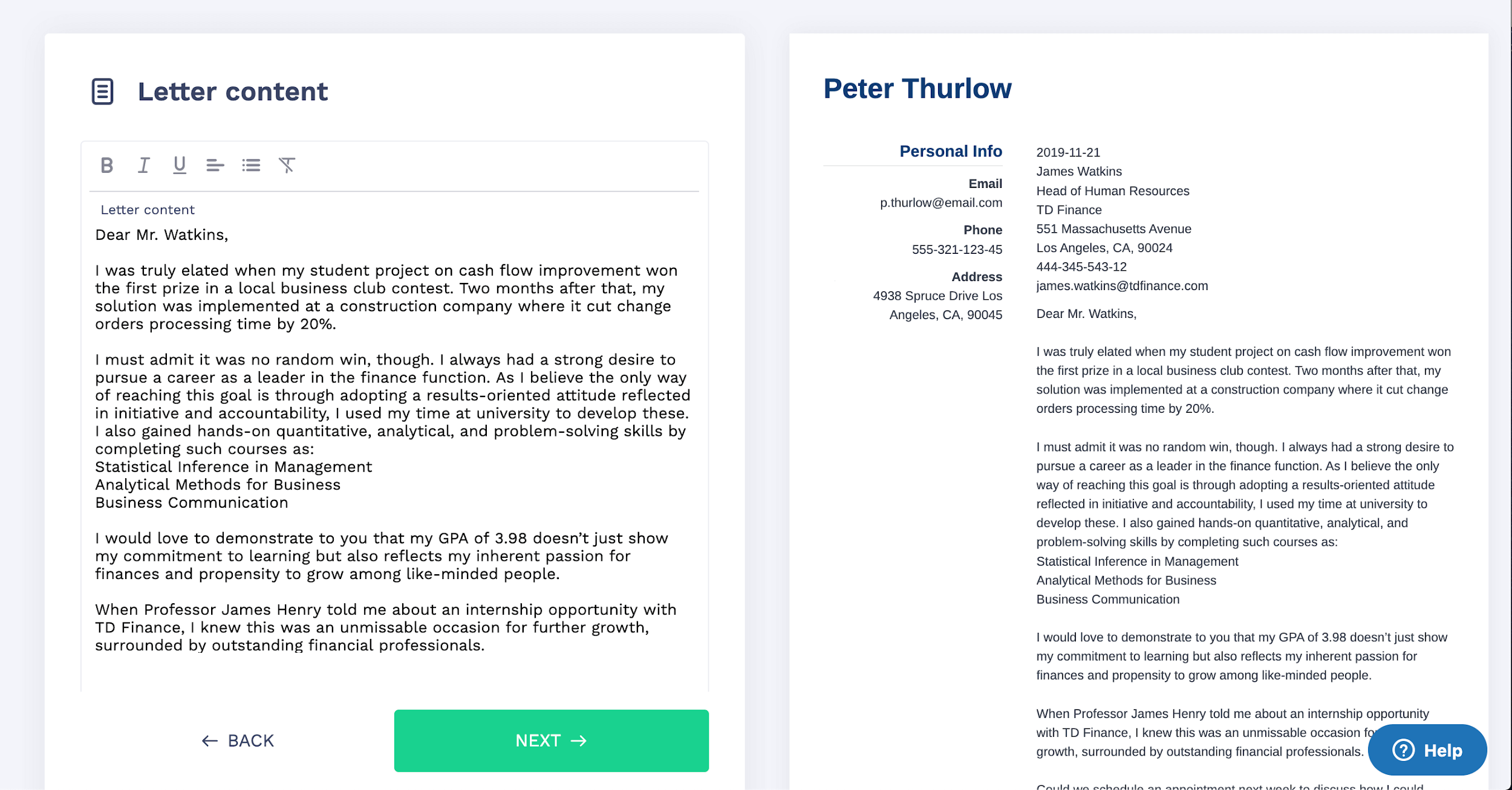
How to Include Volunteer Experience on CV: Examples & Tips
How to put volunteer experience on CVs. When to add volunteer CV work to work experience. How to list volunteer work on a CV to make employers notice.

Tom Gerencer
Career Expert
You’ve just come to the CV education section.
Oh, that’s simple.
School, degree, dates, GPA, and presto—I’m done.
Sure, you could do that…
…and you also could lose out to the other candidates.
Here’s how to format education on a CV in a way which schools all the rest.
In this CV guide, we’ll show you:
Save hours of work and get a CV like this. Pick a template, fill it in. Quick and easy. Choose from 21 CV templates and download your CV now.

What users say about ResumeLab:
I had an interview yesterday and the first thing they said on the phone was: “Wow! I love your CV.”
Patrick
I love the variety of templates. Good job guys, keep up the good work!
Dylan
My previous CV was really weak and I used to spend hours adjusting it in Word. Now, I can introduce any changes within minutes. Absolutely wonderful!
George
By the way, this guide is about writing a CV’s education section. If you are just starting your professional career and want to learn how to write your CV check out these guides:
Like numbers quantifying accomplishments in other parts of a CV, education is proven by degrees and diplomas earned.
On top of that, a CV education section helps show direction—
Employers want hires who are willing to learn and improve, and your education on CV shows that.
When you dress it up with impressive extracurricular activities, relevant coursework, and honours—all the better!
Expert Hint: Double-check if there are no typos in your CV. They undermine your education—and your chances for employment. 58% of employers auto-reject CVs that contain typos.
Like a hotel in Monopoly, you’ve got to locate it strategically.
In the vast majority of cases, put the education CV section just below your work experience section.
But—
Place it after your CV summary (or CV objective statement or summary of qualifications) when:
If you've got little or no experience, put it above the experience section to focus the recruiter's attention on what you have rather than what you don't have.
Expert Hint: Went to a prestigious university? You might want to show that off to make use of the halo effect. This cognitive bias basically says that, because you went to Cornell, you’ve got to be an impressive candidate.
An outstanding education section of CV has its must-include items and for-chrissakes-don’t-add-that details.
In your educational background section, include:
The top 4 items are must-haves. The rest will give you an edge over other candidates.
However, if you've got X years of experience, mentioning those extra items will look awkward as your experience is what matters to employers (i.e., don't say you were a good student, if you've already been expected to be a great professional).
And, don’t weaken your CV education section with these:
And—
What to do if you have some extracurricular certifications or development courses to list?
These should be listed in its own certifications and awards CV section.
Also, if you are a member of a learned society or academic association, add that to a membership section.
Expert Hint: Consistency is key. If you format your dates as November, 2023 in your job descriptions, stick to that same dating format in the CV academic section.
We’re about to show you varying degrees of a great CV education section.
But first—
Here is how to list education on CV:
Here is a no-frills basic sample of education listed on a CV:
BSs in Biological Sciences
Imperial College London
That’s for a completed university span, but it would also work for a college graduate CV.
Expert Hint: If you’ve earned more than one degree, list them separately, even if they’re from the same university.
Now, let’s look at some academic CV examples which include our recommended additions.
BA in Computer Network Security
University of Westminster
Relevant Coursework: network & security applications, internet-of-things, cloud foundations.
BSc in Computer Engineering
University of London
Dissertation: Deep learning frameworks for structural topology optimisation
BSc in Economics
University of London
Publications:
“Methods of Utilising a Line of Text to Say Absolutely Nothing”
BA in Business Management
University of Leeds
Honours & Awards
Expert Hint: Always put Latin honours (cum laude, summa cum laude & magna cum laude) in lowercase italics. Also, cum laude on your CV might make adding Dean’s List redundant, but better have them roll their eyes than lose that achievement!
BA in Sociology
University of Cambridge
Extracurricular Activities:
Some even suggest adding your thesis as an educational element. “You may want to include a separate ‘Thesis’ subsection under the appropriate educational degree and indicate the title of your thesis in italics,” states Harvard Law School.
Our advice is, if it’s relevant, go right ahead!
Please note, of course, that two or more of the various education subsections above may be combined. Just stack them one atop the other.
Expert Hint: Only add extracurricular activities in your education section if they are relevant and affiliated with your time at the school. Otherwise, list relevant activities in a CV hobbies and interests section.
Perhaps you’re still in school now, looking for a job to make ends meet.
What then?
Here’s how to put university on CV if you haven't graduated yet:
Studying Information Technology
University of Hertfordshire, Hatfield, UK
Expected Graduation: 2020
That CV expected graduation can also be listed as: anticipated graduation or completed by.
Additionally, you could style it with credits instead of a date, like so:
Liverpool Hope University, Liverpool, UK
Completed 50 credits toward BA in Accounting & Finance
And what if you dropped out of university or life got in the way and you don’t know when you’ll finish?
Here’s how to list unfinished university on CV when you’re not taking classes anymore:
University of West England, Bristol, UK
Completed 50 credits toward BA in Product Design
BUT!
This means that you should add college below, like so:
Fairfield High School, Bristol
Graduated 2017
The ResumeLab builder is more than looks. Get specific content to boost your chances of getting the job. Add job descriptions, bullet points, and skills. Easy. Improve your CV in our CV builder now.

Nail it all with a splash of colour, choose a clean font, highlight your skills in just a few clicks. You’re the perfect candidate and we’ll prove it. Use the ResumeLab builder now.
If college is your only education, that’s fine!
Just add it as your sole education entry, exactly as in the previous example.
Here is an example of college education on CV:
King David School, Manchester
Graduated 2018
What if you only have college, but haven’t finished yet?
Here is a college student CV example for someone still in school:
Cockburn School, Leeds
Expected graduation: 2020
Here’s how to list college if you’ve left:
Hodge Hill College, Birmingham, UK
Years Attended: 2016–2018
Expert Hint: We don’t recommend dates on finished degrees and diplomas, especially if they’re more than 10 years in the past, but they are useful when the program remains unfinished.
When ATS software scans your CV and parses it for CV keywords, do you feel confident you have the right phrasing?
It’s a trap.
Also in the case of describing your degrees.
Look at the first sentence of the Wikipedia page for a Bachelor of Science:
“A Bachelor of Science (Latin Baccalaureus Scientiae, B.S., BS, B.Sc., BSc, or B.Sc; or, less commonly, S.B., SB, or Sc.B., from the equivalent Latin Scientiae Baccalaureus) is an undergraduate academic degree awarded…”
That’s nine variations to refer to the same degree (without even saying bachelor’s degree)!
So—
First, check the job listing—it’s the perfect cheat sheet.
Refer to your diploma the same way your future employer talks about it.
If they say BA, you say BA.
If they say B.A., add those periods.
But here's a great trick: when talking about diplomas, use the preferred abbreviation and the whole form: Bachelor of Arts (BA).
If the ATS expects to see bachelor not BA, this will double your chances of being understood by those annoying robots.
Employers have specific requirements. But in the case of education and experience on your CV, you can have too much of a good thing—
My father has three master’s degrees and a bachelor’s degree, all in different fields. Retired now, he recently applied for a job as a part-time security guard to pass the time.
He listed all the degrees on his CV, and it took ages for him to finally land the job. For most companies, he was way overqualified.
You might have paid good money for those diplomas, but don’t list them all just to show off!
It is an associate degree and doctoral degree (no apostrophes), but it becomes possessive when saying bachelor’s degree and master’s degree. Western Michigan University says, “Do not use an apostrophe with associate degree or doctoral degree. Do not capitalise the major specialty.”
They also add, “Academic degrees are capitalised only when the full name of the degree is used, such as Bachelor of Arts or Master of Social Work.”
A credit shy of a degree is not a degree. Also, don’t round your GPA up. Nowadays, it is easier than ever for an employer to verify what background you listed, so never lie in your education CV section!
Expert Hint: “Should you write a cover letter?” In short, you should. About 80% of hiring managers say a well-written cover letter will help you get to an interview even if your CV isn’t that great.
Double your impact with a matching CV and cover letter combo. Use our cover letter builder and make your application documents pop out.

Want to try a different look? There’s 18 more. A single click will give your document a total makeover. Pick a cover letter template here.
Got any questions on how to write a CV education section? Not sure how to list minors, coursework, GPAs, activities, or honours? Let’s chat about it in the comments section below, and thanks for reading!
At ResumeLab, excellence lies at the heart of our values, underpinning our promise to provide outstanding career resources. Our team of career experts meticulously assesses each article in line with our editorial guidelines, guaranteeing our content's high quality and dependability. We consistently engage in original research, illuminating the nuances of the job market and earning acclaim from various influential news outlets. Our commitment to delivering professional career advice draws millions of readers to our blog annually.

How to put volunteer experience on CVs. When to add volunteer CV work to work experience. How to list volunteer work on a CV to make employers notice.

Tom Gerencer
Career Expert

A CV job description is a CV section where you list your professional experience, usually in reverse-chronological order. It means you start with your most recent position and proceed backwards. Each entry should contain 3-6 bullet points. It is recommended to include 10-15 years of work history on your CV.

Michael Tomaszewski
Certified Professional Resume Writer, Career Expert

How to write a cover letter for an internship. Internship cover letter sample and formatting guidelines. Cover letter examples for internships that get attention.

Tom Gerencer
Career Expert